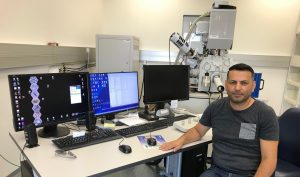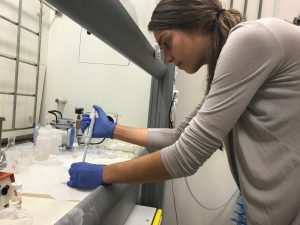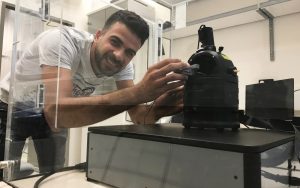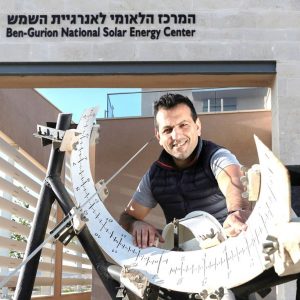
BGU Scientist Makes Smart Devices From Mere Molecules
BGU Scientist Makes Smart Devices From Mere Molecules
August 28, 2019
Alternative Energy, Nanotechnology
ISRAEL21c — If you isolate a single molecule of a conductive metal, can it conduct energy all by itself? That question nagged Ben-Gurion University Prof. Muhammad Bashouti when he was in high school and stumped his science teacher.
Without knowing that another Israeli researcher had found the answer (a resounding “yes”) years before he was born, this inquisitive son of a Muslim Galilee farmer made the correct assumption that every molecule does contain some of the properties of the whole. And he set out to determine how individual molecules of conductors, semiconductors and insulators could help humanity.
Along the way, he discovered something extraordinary: He could harness the properties of molecules to turn them into tiny smart devices that do tasks faster, better, at lower cost, and using less energy and materials than do existing digital devices powered by transistors and diodes.
Prof. Bashouti’s most advanced molecule-based inventions include: an optical biosensor that instantly diagnoses diseases from a single drop of blood or other fluid now being developed to identify tomato-plant viruses with funding from the Israel Ministry of Agriculture and the Jewish Federation of Delaware; transparent lenses embedded with gold nanoparticles that block a specific light wavelength harmful to diabetic eyes; and inexpensive hybrid solar cells that emit more than twice the energy.
Today he is working toward commercialization of these innovations through BGN Technologies, the University’s tech-transfer company. In the newest development, a Chinese company plans to prepare a prototype of his molecular solar cells.

Prof. Muhammad Bashouti with the scanning electron microscope at Ben-Gurion University, which shows the composition of materials down to the level of one nanometer, equaling about 10 molecules
Prof. Bashouti is a lecturer in BGU’s Alexandre Yersin Department of Solar Energy and Environmental Physics at BGU’s Jacob Blaustein Institutes for Desert Research on the Sde Boker Campus. He brings an extensive cross-fertilization of academic expertise to the task. He is also a member of the Ilse Katz Institute for Nanoscale Science and Technology on the Marcus Family Campus in Beer-Sheva and heads a nanotechnology lab in Sde Boker.
Switching between campuses and languages over the course of the day is normal for Bashouti. He speaks Arabic, Hebrew, English, and German and supervises 10 Israeli and international graduate students (including postdocs) plus two lab technicians and two visiting scientists.

Master’s student Tabea Heckenthaler in Prof. Bashouti’s lab at Sde Boker, working on modifying silicon surfaces
They use sophisticated machines, some custom-made, to work with and observe the behavior of molecules too minuscule to see or manipulate.
Bashouti’s multidisciplinary team includes a chemist to bond the molecules to the surface; a physicist to check the bond; an electrical engineer to operate the nanodevices; a theoretical physicist to analyze the energy transfer between molecules and surface; and a biologist to decide where to place the molecules on the surfaces for the desired effect.

Ph.D. student Awad Shalabny with a rare custom-designed machine that measures electrical and magnetic energy at the atomic level
Bashouti and his team have discovered that molecules can be enhanced with additional properties they don’t have intrinsically. That will make possible such nifty inventions as optical switches composed of molecules enhanced with light-absorbing properties.
The possible applications for the molecular chips are endless, ranging from clean energy to telecommunications to medicine.
Frequently traveling to conferences and potential partners around the world, Bashouti has come a long way from his modest Galilee roots. Still, he credits his father and his mother, a self-educated homemaker, with instilling in their seven sons a thirst for knowledge and a respect for people of all religions and cultures.
Today, he volunteers with Tipa Bamidbar (A Drop in the Desert), a BGU-sponsored program encouraging Bedouin high school students in the Negev to pursue higher education.
Perhaps one day, some of these students will join him in the exciting work of turning molecules into smart devices.




